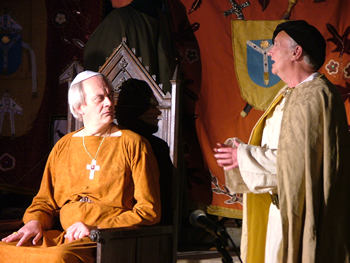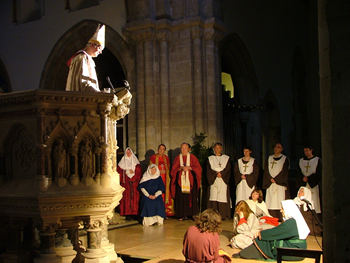Written By
T.S. Eliot
Where and When
25th – 28th May 2005 @ The Minster Church of St Cuthburga, Wimborne Minster
The Plot
This well known drama by one of the world’s greatest poets tells of the martyrdom of Archbishop Thomas Becket who, though tempted, refuses to seize temporal control of England.
Cast
- Thomas Becket – Jeremy Austin
- Tempters/Knights
- David Pile
- David Williams
- Stuart Glossop
- Tony Feltham
- Priests, Monks and Chorus
- Barry Baynton
- Bob Hucklesby
- Boo Feltham
- Colin Pile
- Fiona Sinclair
- Gerry Carroll
- Graham Hawkins
- Jan Bursby
- Jan Singfield
- Jan Stevenson
- Jean Dishington
- Joan Higgins
- Kenlis Horitz
- Penny Pearson
- Roy Birch
- Simon Jackson
- Stephen Stones
- Tracey Nicholls
- Val Mantle
Creative Team
- Director – Enid Davies
- Stage Management and Design – Mark Ellen, Eddie Colton and Wendy Houlton
- Sound and Music Design – Jackson Ellen, James Singfield and Howard Lovejoy
- Lighting Design – Steve Charters and Mike Dishington
- Wardrobe – Carolyn Hewitt and Jennifer Stacey
- Properties – Caroline Uwins
- Backdrop Panels – Enid Davies
- Shields, Crozier and Banner carrier – Eddie Colton and Saliann Colton
- Banners – Sally Edge
- Winter Floral Display – Daphne Young
- Programme and Publicity – Richard Neal
- Front of House – Richard and Chrissie Neal
Preview
Never afraid to shirk a challenge, Wimborne Drama is moving away from its familiar surroundings to take part in a special festival event next week.
The comapny, which has been based at The Tivoli Theatre since 1994, has been invited to perform in the Monster Churh of St Cuthburga, Wimborne Minster, as part of the church’s celebration of 1300 years of Christian worship.
And the play chosen to mark this special occasion could hardly be more fitting. Wimborne Drama will perform Nobel Prize-winning poet T.S. Eliot’s provocative verse play Murder in the Cathedral, which he wrote for the Canterbury Festival excatly 70 years ago.
The play is set in December 1170and deals with the conflict between Henry II and Thomas Becket, his former chancellor and friend. Henry, seeking to control the church and its revenues, appointed Becket as Archbishop of Canterbury. But once in his new office Becket fought for th church’s autonomy, a move that he knew would enrage Henry and lead to his death.
Murder in the Cathedral explores issues of religion and politics – the struggle between human and devine power, and between church and crown – and examins the deepest questions of human existance.
“We are honoured to be invited to take part in the St Cuthburga celebrations” says Wimborne Drama publicity manager Richard Neal. “Murder in the Cathedral has a strong spiritual message and it seems an appropriate choice of production for this special event. The Minster will provide a wonderful setting for Eliot’s soaring poetry and dramatic excitement”.
Jeremy Austin as Becket leads the large cast assembled by Enid Davies.
Gallery
Reviews
A shiver went down my spine as the four knights stormed their way into the Minster to murder Thomas Becket. I’d known it was coming all along but the tension had been so effectively built up that I couldn’t help but flinch.
Wimborne Drama was invited to perform in the Minster at the start of the church’s celebration of 1,300 years of Christian worship. Apart from Canterbury Cathedral itself, there can’t be many better stages for T S Eliot’s evocative verse play.
Set on a raised stage at the centre of the Minster, with light streaming in from the stained glass window behind the altar, the atmosphere was perfect. As dusk gave way to night, the scene was set for the confrontations with the knights and the eventual dark murder.
The action takes place during the few days leading up to the martyrdom of the Archbishop of Canterbury, whose internal struggle is the main thrust of the play. Having come into conflict with secular authority, Becket is visited by a succession of tempters, who variously urge him to avoid or to seek martyrdom.
It was a confident performance throughout. Jeremy Austin was an inspiring choice as Becket. He captured the Archbishop’s dignity and humility as he ponders on his fate. The audience warmed to the man, feeling relief for him as he finally achieves peace of mind by electing not to look for sainthood but to accept death as inevitable. We admired him and grieved for him.
Tony Feltham, Stuart Glossop, Dave Williams and David Pile played tempters and then knights giving powerful performances in both roles. Their explanations for why they had to kill Becket were convincing, almost making the audience, as judges, believe that Becket had effectively committed suicide.
The performance of the Women of Canterbury was simply superb. They worked together effectively as they wailed and worried and set the scene for the action. We felt their pain and grief as they suffered. Brilliant acting throughout.
The whole of Wimborne Drama rose to the challenge of this play. Director Enid Davies should be celebrating her achievement in a magnificent production, which was justifiably sold out for every performance.
Accuracy resulting from excellent research into the 12th century, costumes, music, properties and quality front of house made this a “theatre” trip to be relished. The play was an inspired move by the organisers of the Cuthberga celebrations.
WIMBORNE Drama were invited to perform this production as part of the celebrations commemorating the 1,300th anniversary of the founding of the Minster, and a more appropriate play could hardly be imagined in this setting.
However, TS Eliot’s drama about the murder of Thomas Becket is heavy going. It is incredibly wordy and needs your full concentration, only really coming to life towards the end when the protagonists are discussing the moral and ethical implications of their deeds. So it wasn’t altogether surprising that, on the first night at least, a trickle of the audience sneaked off during the interval, never to return.
But that was rather a shame, as director Enid Davies and her cast undertook the play’s challenges with gusto and commendable results. In particular, the “Greek Chorus” of ladies stood out, as did the four knights – Tony Feltham, Stuart Glossop, David Pile and Dave Williams – while Jeremy Austin’s Thomas Becket showed an impressive amount of resignation about the inevitable.
The various backdrop panels and banners added authenticity, as did the superb background music and sound, plus the Minster’s own “sound effects”.
But sorry, I’d rather have Old Possum’s Book of Practical Cats any day.
























